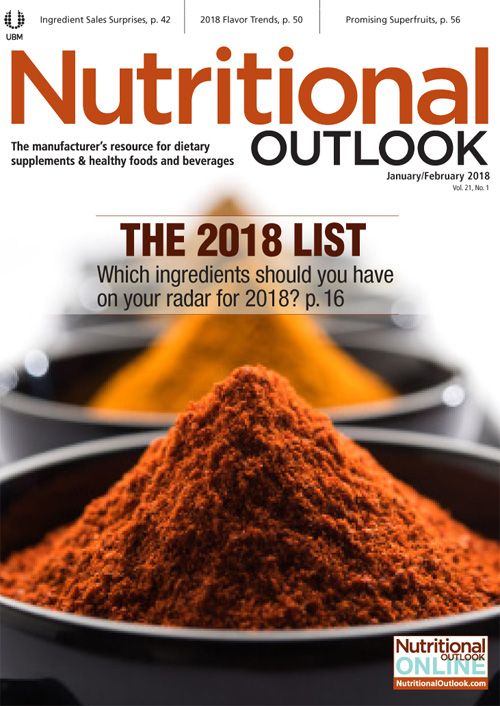Dietary Supplement Contract Manufacturing: Staying One Step Ahead
Contract manufacturers predict how politics and consumer trends may affect the industry in the year ahead.
Photo © Shutterstock.com/Cergios

Contract manufacturers have their finger on the pulse of the natural products industry in ways that few others do. They often help finished product makers execute line extensions and new launches months, even years, before the rest of us see them. At the other end of the spectrum, contract manufacturers hear about the end of product lifecycles well before discontinuation notifications are disseminated.
To get their take on what 2018 may hold for the natural products industry, Nutritional Outlook spoke politics and trends with several industry contract manufacturers. Which way may the winds of change be blowing, and why?
Tax Time
In 2018, flexibility and adaptability will be as important as ever for manufacturers that want to stay abreast of the shifting political and regulatory landscape. Chief among these shifting plates are the new Republican-created Tax Cuts and Jobs Acts; the potential effect of a less-funded FDA on plant inspections, recalls, warning letters, and the New Dietary Ingredients (NDIs) notification process; and the retirement of industry champion Senator Orrin Hatch (R-UT).
Regarding the first item on the list, Kathy Paffendorf, sales account executive, Pharmachem, a division of Ashland (Kearny, NJ), says that the sweeping $1.5 trillion tax bill signed into law last December is sure to affect contract manufacturers.
Proponents of the bill have touted its benefits for corporations and manufacturers-namely, significant tax cuts for corporations and less complex investment purchasing guidelines.
And this new tax law, Paffendorf says, will have some impact on manufacturers in the dietary supplements industry-though how big remains to be seen. She explains: “With companies now allowed to purchase equipment and write off the investment within the same year, I would expect that those [contract manufacturers] who were thinking about expansion would take the leap and take advantage of this opportunity. This would have a major impact for industry growth.”
Might upgrades lead to faster production timelines, additional capacity, increased innovation, and overall industry growth? Only time will tell.
FDA’s Way
Some industry growth may, however, be potentially diminished by a slower NDI process. William Solomon, CEO, SternMaid America (Aurora, IL), says that as the dietary supplements industry has experienced growth in the past few years, so too have regulatory efforts and crackdowns. The FDA’s NDI notification process, he says, is one such measure, though he notes that “how exactly this will be implemented and enforced remains to be seen.”
The newest version of the NDI draft guidance was released in 2016, and with it came about as many questions as there were answers regarding terminology and how the process will be implemented. In its first iteration in 2011, the draft guidance stirred up no shortage of hubbub. An August 2016 revision was slightly better received, but many in the industry came away from even the revised guidance with a sense of unease, and visions of a slowed-down and costly NDI process to come.
Best Formulations’ (City of Industry, CA) CEO Eugene Ung points out that while the current administration may be slightly more pro-supplement than others, the FDA’s budget was slashed as well, to the tune of $40 million, “which means the Office of Dietary Supplement Programs (ODSP) is also underfunded. This may result in slower FDA actions, such as with issuing new NDIs.” Time is money.
And, with FDA’s eye trained on good manufacturing practices (GMPs) compliance, manufacturing firms are going to have to step up. Says Steve Holtby, president and CEO, Soft Gel Technologies, Inc. (Los Angeles): “In order to anticipate the future needs of customers, contractors need to be proactive by advising customers of the implications of the FDA GMPs for dietary supplements. GMP compliance will help the dietary supplement industry build trust with consumers.”
As we wait and see what regulatory changes may roll out under an administration that promised deregulation, one of the best ways to deal with the uncertainty may be vigilance. Says Paffendorf, “The regulatory environment is constantly changing and we need to stay ahead of the latest revisions and enforcement.”
People Watching
Of Hatch’s retirement, which marks the end of a 40-year-long Senate career, Paffendorf says: “We need more supporters of our industry in Congress. We need to pursue significant efforts to educate our Congresspeople on industry efforts for improved safety standards, labeling, and quality.”
On the other hand, many industry experts agree that the Trump administration appears to be decidedly more pro-supplement than the previous administration. De-regulatory inclinations aside, some other factors may work in the industry’s favor in 2018.
Case in point: Last May’s confirmation of Scott Gottlieb, MD, to the position of FDA Commissioner. Gottlieb’s appointment was met with approval from industry associations like the Council for Responsible Nutritional (Washington, D.C.) and the Natural Products Association (Washington, D.C.), which said that Gottlieb understands the supplements industry, supports product integrity, and is committed to enforcing current industry regulations.
What Consumers Want
While the regulatory waters keep on rolling well into 2018, it’s as important as ever for manufacturers to keep their eyes on the consumer. Fortunately, what consumers are looking for aligns (for the most part) quite nicely with the increased emphasis on regulatory enforcement. Says Shaheen Majeed, president, Sabinsa Worldwide (East Windsor, NJ), “Transparency is in the minds of consumers today, as labels on many popular products on the shelf reflect. Transparency can only happen if both supplier and contract manufacturers talk the right language to each other.”
He adds that “scientific validity is also growing with the consumer base; therefore, contract manufacturers that are helping to create brands that will reach the mass market must be aware of this and ensure the science is proper.” Cutting corners, if ever it was an option, certainly isn’t anymore.
SternMaid’s Solomon agrees: “Consumers expect consistent taste and appearance in their favored products, as well as a continual stream of diversity. If a product fails to meet consumer standards, they will quickly find an alternative. For contract manufacturers, this means focusing on quality, reproducibility and operational flexibility.”
Aside from more traceable products, consumers also have their eyes on a few key ingredients. Some ingredients that experts interviewed for this story say will be big with consumers in the coming year include probiotics, curcumin-based products, general wellness products, proteins both alternative and familiar, oils, and collagen. But while these ingredients are riding a wave of increased popularity that’s been building for a few years now, another ingredient that companies are keeping an eye on this year is cannabidiol (CBD) oil. Success of the latter as a dietary supplement ingredient, however, remains to be seen.
Wait and CBD
Holtby says that CBD may be one of the biggest ingredients to watch in 2018, depending, of course, on how its legal position evolves. “If CBD emerges as a legal supplement,” he says, “it would have a far-reaching effect for the industry since it possesses health benefits.”
Currently, 29 states plus the District of Columbia have legalized cannabis to some extent, while eight states plus D.C. have legalized recreational marijuana use. Strictly speaking, CBD is not the same as its cousin cannabis. While both cannabis and hemp contain CBD, hemp has much higher levels of CBD than of tetrahydrocannabinol (THC), but with cannabis, the reverse is true.
Holtby says that although California recognizes marijuana-both medical and recreational-as legal, and CBD products are covered by those same medical marijuana legal protections, “the legal status of CBD oil products remains confusing since the U.S. Drug Enforcement Administration published a rule that all cannabis extracts, including CBD, are considered Schedule I controlled substances.”
Confusion over the legal status of CBD oil is causing companies like Soft Gel to hit the pause button on CBD. But, he notes, “if CBD emerges as a legal supplement, it would have a far-reaching effect for the industry since it possesses health benefits,” which purportedly include anti-inflammatory and tumor-fighting benefits, as well as managing nausea and anxiety, among many others.
Sustainability and Traceability
Regardless of CBD’s potential in the dietary supplements market-or any other ingredient, for that matter-in 2018, manufacturers will sink or swim depending on traceability and sustainability. Obviously, deeper regulatory scrutiny will make this increasingly imperative. Plus, consumers are more informed than ever before. Thus, notes Sabinsa’s Majeed, “a supplier that is not disclosing specifics about their propriety ingredient or blend will not make it very far with consumers.”
And it just makes sense from a business perspective. Holtby says that Soft Gel has made sustainability a key aspect of its business. “Depletion of natural resources has become a common concern,” he says, “which is why lean manufacturing processes have replaced the methods of the past. Lean manufacturing and green thinking, otherwise known as supply chain environmental management, are mutually beneficial.”
Other companies can benefit from this line of thinking, he adds, because “in the future, as the cost of material and energy continues to increase and becomes a larger component of the cost of manufacturing, organizations will need to adopt sustainability strategies.”
This Is a Test
The issue of adulteration, inextricably linked to traceability and transparency, has likewise seen no shortage of press in recent years. From botanical brouhahas to sports nutrition adulteration, the issue of tampered-with ingredients looms large over the industry. While careful and conscientious manufacturing firms have always been responsible about ingredient sourcing, cleaning out the bad actors is now an industry imperative.
But on whose shoulders should the burden rest? Sabinsa’s Majeed says that while many contract manufacturers shrug testing off to labs, “that’s not how it should work. Contract manufacturers are part of the problem and they can be a great solution as well,” he states. “Contract manufacturers must get involved in the testing process; they don’t need a major laboratory setup, but should have the right [people] to discuss and evaluate the outcomes.”
He adds that the biggest hurdle to ensuring that manufacturing remains on the up-and-up is pricing: “[Pricing] is sadly the first thing that gets many in the supply-chain in trouble. It’s so obvious, though-if you’re selecting the cheapest ingredient without a proper set of quality tests, you’re asking for trouble.”
Majeed says that not all tests are the same, however, so it’s important to ensure that labs are not only testing thoroughly, but testing “the right things in the right ways.” For example, he notes, a 95% curcuminoids blend can be adulterated with synthetic curcumin, and no tests or lab work will be able to determine that synthetic component. Instead, the blend should be sent to a lab that does carbon dating.
SternMaid’s Solomon, meanwhile, explains that while quality testing in the manufacturing process has become more sophisticated in recent years, contract manufacturers have been obliged to invest in new technology and education for both the company and its customers. And this, he adds, is an essential component of doing business in the supplements industry today. “Today’s contract manufacturers not only have to comply with cGMP 21 CFR Parts 110 and 111, but they must also understand the regulatory policies of the FDA and the FTC,” he explains. “This translates into a contract manufacturer knowing and advising clients continually throughout their relationship, as opposed to just fulfilling orders.”
While there’s undoubtedly still work to be done on the quality control front, contract manufacturers appear to be meeting the challenges that come with technological and regulatory developments head-on. Says Ung: “We are getting many more requests from our customers for additional testing.” Heavy metals and pesticides testing, he adds, are just two examples of the kinds of supplementary testing companies may need to consult.
A Clear Path Forward
If it seems as though there are a million things to keep in mind to make both consumers and FDA happy, Majeed offers a solution: “Instead of pricing shopping, get to know your suppliers. You don’t have to cut out brokers, but leverage them to get to know suppliers better. This is not rocket science.” He adds that contract manufacturers have both a responsibility and right “to ask about the source and how ingredients have been handled and processed. In fact, they have every right to audit as well.”
But even so, sometimes the surest way to conduct good business is to stay away from adulterated materials and dodgy suppliers. As Paffendorf puts it, “A conservative approach is always better.”
Also read:
Dietary Supplement Contract Manufacturing in a Time of Trump

Prinova acquires Aplinova to further increase its footprint in Latin America
April 7th 2025Prinova has recently announced the acquisition of Brazilian ingredients distributor Aplinova, which is a provider of specialty ingredients for a range of market segments that include food, beverage, supplements, and personal care.

























